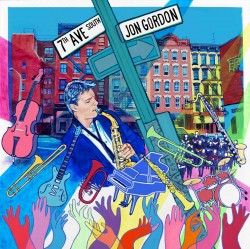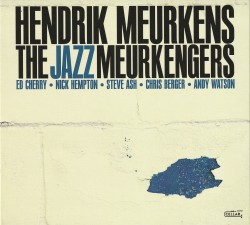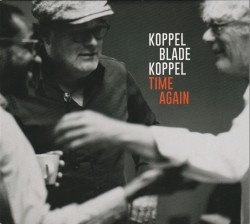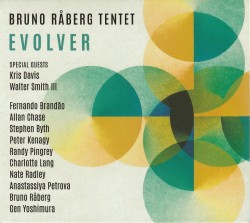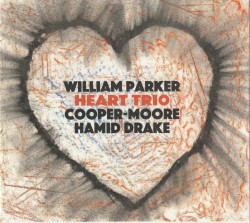 Heart Trio
Heart Trio
William Parker; Cooper-Moore; Hamid Drake
Aum Fidelity AUM118-2 (aumfidelity.com)
Cereal Music
William Parker; Ellen Christi
Aum Fidelity AUM119-2 (aumfidelity.com)
The words “ancient to the future” may sound like a Zen Koan to those befuddled by their meaning. However, it describes William Parker perfectly because of all the musicians alive today – and many no longer with us – no one but Parker seems to travel back and forth through the music continuum; an earthling making music in a glorious arc between earth and sky traversing back and forth between Mother Africa and the Americas, Europe and the near and far east. Indeed, Parker is a musician unlike any other, cut from an artistic cloth, both ancient and modern.
I have listened to these two recordings – Heart Trio and Cereal Music – intermittently for several weeks, and the capacity of Parker’s music to linger – to evolve inside the inner ear once the sounds themselves have breathed their last – leaves a nourishing post-listening afterglow.
As a card-carrying, dyed-in-the-wool member of the William Parker (the composer) fan club I confess to also being a longtime subscriber to his belief in Universal Tonality (also a two-disc recording dedicated to this concept, released on Centering Records in 2023). In notes to that recording that are characteristically enigmatic and mystical, Parker writes that “When a feather falls and touches the ground music begins. Nothing is said. There are no keys, no chord changes, modes, or notations… we speak different languages, but we feel each other. The music guides us. All we have to do is listen. All we have to do is feel. The sky, mountains, and trees all understand Universal Tonality and they always have.” He also sees “…many musicians carrying all kinds of musical instruments. From all over the world.” And so on, as he lures you into his musical manifesto.
Parker also “plays” – as he puts it – “inside the rainbow.” This is far from delirium. It is the voice of a griot and a shaman rolled into one. His music poses existentialist musical questions such as those raised by John Cage’s 4’33”, Parker’s music privileges active listening over hearing.
As multi-instrumentalist and poet who often recites his verses, Parker’s recording Heart Trio includes two like-minded musicians. One is the percussion colourist Cooper-Moore (playing ashimba and hoe-handle harp), and the other is the frame drummer Hamid Drake, who also sits in on a drum set. The resulting music is the epitome of Parker’s conception of Universal Tonality.
Employing the West African doson ngoni (a stringed instrument made of wood or calabash) that stands in for the bass, a bevy of flutes and the double-reed bass dudek, Parker weaves often amorphous melodic, harmonic and rhythmic lines into the colourful percussive sounds issued by Cooper-Moore and Drake. Thus, we meet Five Angels by the Stream, wraith-like and ephemeral. The blaring cityscape in Serbia co-exists with the glacial quietude from its countryside. We also meet personalities such as Japanese trumpeter Toshinoro Kondo and legendary drummer Rafael Garrett in portrait pieces. The celebratory Afri-centric Processional brings this remarkable recording to a close, but not before we might feel the music pulsating from inside the heart itself.
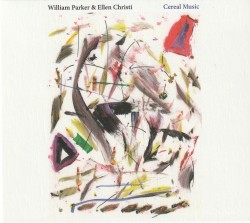 The recording Cereal Music is a metonymic feature for Parker and Ellen Christi, both of whom recite – Parker also chants bringing his velvet tenor to bear on his idiomatic poetry – and both serve up the music as if on an edible table of plenty. Parker also returns to playing the contrabass, and an array of flutes. The portraits of the late tenor saxophone player Kidd Jordan and Sonny (for the retired tenor saxophone titan, Sonny Rollins) are timeless. Parker’s recitation and instrumental connective tissue melts into Christi’s atmospheric sound design. Elsewhere on this 15-track set, on Birth and Death chromatic notes sigh, but the harmonic cushioning rarely falls where you anticipate. The pinnacle – to my mind – is We Are Very Civilised with his Afri-centric rhythms, propelled by the shimmering chimes of the Moroccan qraqeb – a large iron castanet-like musical instrument primarily used as the rhythmic aspect of Gnawa music into which the musicians expertly gravitate. By now, we realise that Parker is also immersed in the gnawa tradition of Morocco, drawing a very willing Christi in his wake.
The recording Cereal Music is a metonymic feature for Parker and Ellen Christi, both of whom recite – Parker also chants bringing his velvet tenor to bear on his idiomatic poetry – and both serve up the music as if on an edible table of plenty. Parker also returns to playing the contrabass, and an array of flutes. The portraits of the late tenor saxophone player Kidd Jordan and Sonny (for the retired tenor saxophone titan, Sonny Rollins) are timeless. Parker’s recitation and instrumental connective tissue melts into Christi’s atmospheric sound design. Elsewhere on this 15-track set, on Birth and Death chromatic notes sigh, but the harmonic cushioning rarely falls where you anticipate. The pinnacle – to my mind – is We Are Very Civilised with his Afri-centric rhythms, propelled by the shimmering chimes of the Moroccan qraqeb – a large iron castanet-like musical instrument primarily used as the rhythmic aspect of Gnawa music into which the musicians expertly gravitate. By now, we realise that Parker is also immersed in the gnawa tradition of Morocco, drawing a very willing Christi in his wake.
 Accidentals
Accidentals



